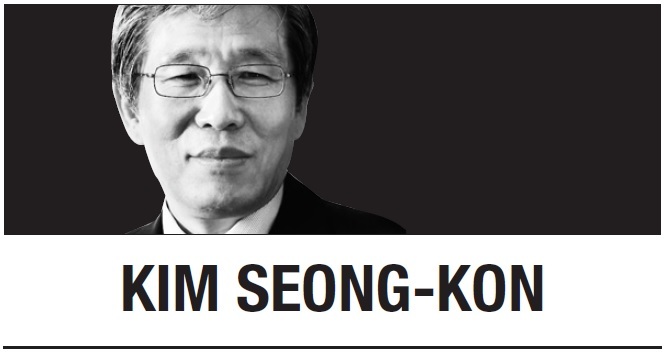
Such a situation is not new to the Korean people; we were also stuck in the crossfire between China and Japan in the 19th century. Back then, Korea could not escape the crisis and lost her sovereignty as a result. Now, Korea is witnessing the advent of a second Cold War between the US and China that will surely send our economy reeling, which heavily depends on the trade between the US and China.
There is a Korean maxim, “Where two whales collide, a shrimp gets a broken spine.” To give the phrase an added twist, some people have said that the shape of the Korean Peninsula resembles a shrimp. Yet there is also a Korean fairy tale of an astute rabbit, who earns respect from two gigantic fighting animals, an elephant and a whale by acting wisely. Interestingly, the Korean Peninsula also looks like a rabbit.
Up until now, Korea’s strategy has been twofold: for the sake of national security cooperate with the US, and as for the economy, collaborate with China. However, such strategic ambivalence will no longer work for Korea, as neither the US nor China will tolerate abstruse or opportunistic diplomacy. Thus, experts warn that Korea is now facing the unprecedented dilemma of needing to find an exit even as there is “no way out.”
Recently, US President Donald Trump invited South Korea, Australia, India, and Russia to the G-7 Summit, presumably to foster solidarity against China. Although Korean politicians seem flattered, we cannot be pleased wholeheartedly even though we appreciate the friendly gesture from Washington, because accepting the US invitation will surely make China uncomfortable. From the standpoint of what is in Korea’s best interest, the “both/and” strategy is by far the superior option to the “either/or” policy because the US and China are equally important to us. Yet, Korea has no way of pleasing the two countries at the same time.
To achieve the best outcome in this situation, the Korean government should listen to professionals and, for that purpose, should organize an emergency council immediately. The council should comprise experts on not only international politics and diplomacy, but also America and China. Since Korea’s future is at stake, our politicians should approach the issue with the utmost care and discretion, not with their left or right political ideology.
As much as we like to trust our politicians, we are worried about their competence and ability to handle this situation smoothly and skillfully. In the past, Korean politicians have been myopic and parochial when it comes to international politics and have often made fatal mistakes at critical points. For this reason above all, we should urge them to consider some basic principles of orientation and conduct before making a decision.
First, our politicians should take into account Korea’s identity when they decide what to do and where to go at the crossroad. For example, if Korea is a capitalist country that values liberal democracy and individual freedom, we should act accordingly. That is to say, joining the nations that share the same ideals and visions should be Korea’s priority. Of course, we can become a friend of a country that does not share the same values, goals, and systems with us and yet, we cannot become an ally of her.
Therefore, the next thing we should keep in mind is “Who is our ally?” It is only natural that we should be loyal primarily to our ally, so we can remain as a reliable and trustworthy ally ourselves. It would be weird if we turned our back on our ally and collaborated with another nation. Besides, our ally will come to rescue us when our country is in trouble, whereas other countries will not.
Keeping these principles in mind, our politicians should be wise enough to make the most of our relationship with the US as an advantage and leverage when dealing with China, and vice versa. We can logically explain our complex situation to both countries and ask for their understanding and support. If we have to lean on one of the two, we can request and secure her guarantee of protection and compensations as a safety measure. We should be subtle yet firm; polite yet dignified. At the same time, we should not be obsequious or subservient under any circumstances.
The situation of Korea resembles that of Ulysses in Greek mythology, who had to sail between Scylla and Charybdis to reach his peaceful home in Ithaca. If we do not manage to navigate through these two gigantic, dangerously moving reefs, we will be capsized and doomed. If we are clever like Ulysses, however, we will overcome the impending ordeal and prevail.
Kim Seong-kon
Kim Seong-kon is a professor emeritus of English at Seoul National University and a visiting scholar at Dartmouth College. -- Ed.



![[AtoZ into Korean mind] Humor in Korea: Navigating the line between what's funny and not](http://res.heraldm.com/phpwas/restmb_idxmake.php?idx=644&simg=/content/image/2024/04/22/20240422050642_0.jpg&u=)
![[Exclusive] Korean military set to ban iPhones over 'security' concerns](http://res.heraldm.com/phpwas/restmb_idxmake.php?idx=644&simg=/content/image/2024/04/23/20240423050599_0.jpg&u=20240423183955)



![[Graphic News] 77% of young Koreans still financially dependent](http://res.heraldm.com/phpwas/restmb_idxmake.php?idx=644&simg=/content/image/2024/04/22/20240422050762_0.gif&u=)
![[Herald Interview] Why Toss invited hackers to penetrate its system](http://res.heraldm.com/phpwas/restmb_idxmake.php?idx=644&simg=/content/image/2024/04/22/20240422050569_0.jpg&u=20240422150649)





![[Exclusive] Korean military to ban iPhones over security issues](http://res.heraldm.com/phpwas/restmb_idxmake.php?idx=652&simg=/content/image/2024/04/23/20240423050599_0.jpg&u=20240423183955)



![[Today’s K-pop] Ateez confirms US tour details](http://res.heraldm.com/phpwas/restmb_idxmake.php?idx=642&simg=/content/image/2024/04/23/20240423050700_0.jpg&u=)